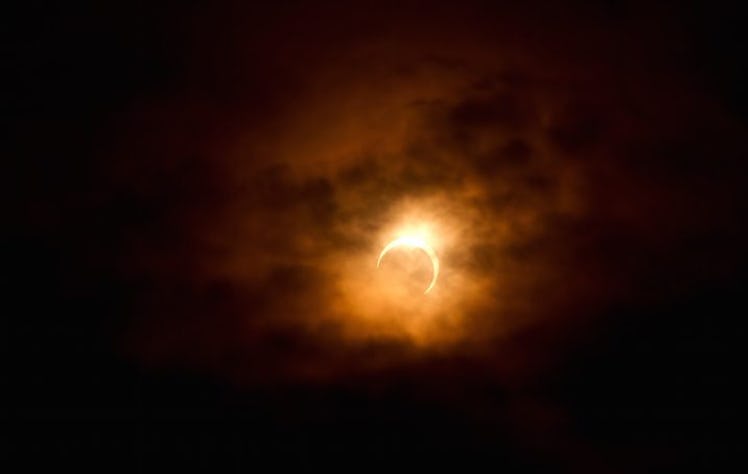
7 Hilarious Things People Used To Believe About The Solar Eclipse Throughout History
The Monday eclipse will be the first of its kind in the contiguous United States since 1979 -- and these days, people look forward to the unusual event. But the history of the solar eclipse includes quite a lot of colorful stories, as you can imagine. Before astrologers figured out that a solar eclipse is simply the moon passing between the sun and earth (a scientific explanation we can all wrap our heads around), our ancestors had to come up with some reasons the sun disappeared from the sky mid-day.
Sure, some of them seem a little kooky to us now, but the Earth's light source peacing out is pretty unsettling. Thank goodness we have science now to calm our nerves -- or in the president's case, ignore reason when it comes to climate change. Either way, we're all in agreement on what the eclipse means, but it's still pretty amusing to look back at all the insane things people once believed to be true about the solar eclipse.
It's An Omen Of Doomsday
The first record of a solar eclipse was about 4,000 years ago by Chinese astronomers in 2134 B.C.E., who kept very accurate and detailed records of the positioning of celestial objects. They thought a solar eclipse was an omen of doom.
Maybe An Irritable Bear Ate The Sun
The Native American Pomo tribe of Northern California believed that a hangry bear walking through the Milky Way had the sun for lunch. And they weren't the only people to believe the sun served as a snack, either. The ancient Chinese thought it was a dragon, and in Hindu mythology, it was an amorphous demon. In Paraguay, a jaguar devoured the sun.
The Gods Must Be Angry
The ancient Greeks also believed it was their gods' way of warning the Earth would soon be destroyed.
And in 585 B.C. the eclipse actually stopped a war. The Battle of Halys, a war that had been going on for more than a decade in Central Asia between the Medes and Lydians just up and stopped--as they interpreted the eclipse as a sign from the gods to quit fighting. It inspired a treaty between the two groups.
I wouldn't mind if that interpretation came back, you know?
You Better Believe It Was Considered Bad For Babies
Aztecs, who sacrificed human captives for the mercy of sun, thought an eclips could cause major bodily damage to babiese , and according to David Baron's book American Eclipse, up until the '70s, the Indonesian government advised pregnant women to stay inside.
It Was Thought The Sun Could Be Re-lit
The Native American Chippewa people believed they could fix the sun by shooting flaming arrows into the sky. If only, right?
It's Just God Letting People Know Who's Boss
It's recorded that the prophet Amos told people in the Bible, "And it shall come to pass in that day, said the Lord GOD, that I will cause the sun to go down at noon, and I will darken the earth in the clear day."
OK.
Either way, historians were able to mark this date as June 15, 763 B.C. and at the time, it was considered a cause for calamity and potentially the overthrow of Israel. But some still believe it was the marker of what they call “the only begotten son's death.” That would be Jesus Christ, FYI.
Oh, And Fictional Characters Can Use These Myths, Too
In Mark Twain's A Connecticut Yankee in King Arthur's Court, the titular character is able to save himself when he convinces the court he can turn out the lights of the sky — which he "does" and they believe him. Stephen King used an eclipse in some stories, too, as did Billy Shakespeare.
So if you're in the eclipse path, get out there on Monday to see it, friends -- while solar eclipses happen about every two years, most of those are only visible from the ocean.
Oh, and don't forget your eclipse glasses, please.